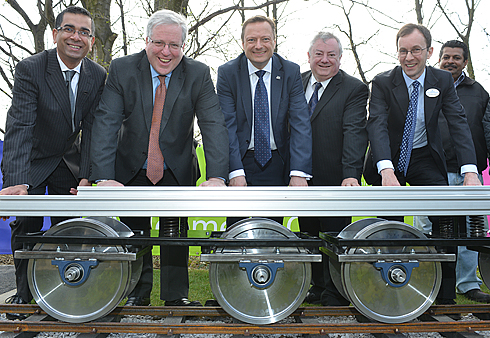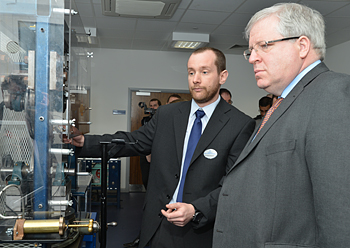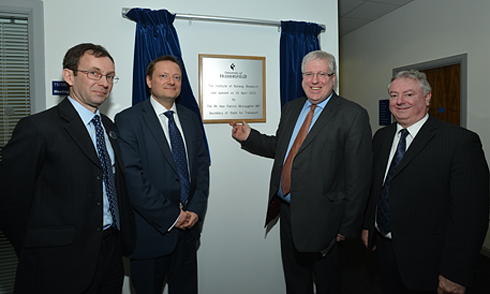Minister opens Institute of Railway Research
Mon, 15 Apr 2013 16:03:00 BST
The Rt Hon Patrick McLoughlin MP welcomed to the University of Huddersfield

Pictured left to right are Kirklees Council Leader Mehboob Khan, Secretary of State for Transport Patrick McLoughlin MP, Colne Valley MP Jason McCartney, the University’s Vice-Chancellor Professor Bob Cryan and Head of the Institute of Railway Research Professor Simon Iwnicki.
A GOVERNMENT minister has said that the University of Huddersfield will be crucial in producing the engineers and industry leaders required to meet the massive increase in demand for rail travel and transport.
The Secretary of State for Transport, Patrick McLoughlin MP, paid a visit to the University in order to launch a research unit that will play a major role in the safety and environmental sustainability of the railways of the future.
The Institute of Railway Research (IRR), which has 16 researchers based in a suite of specially-equipped labs, is involved in a wide range of projects – in Britain and overseas – with partners that include Network Rail, London Underground, TATA Steel, the Rail Research UK Association and the Rail Safety and Standards Board.
 Professor Simon Iwnicki, who heads the Institute, welcomed Mr McLoughlin and described key areas of research taking place at the IRR. The Secretary of State met a succession of the Institute’s experts. He saw some its specially-installed rigs in action as they simulate the crucial and complex areas of contact between rail and wheel. He also saw how the Institute used computer modelling to seek solutions to modern challenges, including the development of new types of track.
Professor Simon Iwnicki, who heads the Institute, welcomed Mr McLoughlin and described key areas of research taking place at the IRR. The Secretary of State met a succession of the Institute’s experts. He saw some its specially-installed rigs in action as they simulate the crucial and complex areas of contact between rail and wheel. He also saw how the Institute used computer modelling to seek solutions to modern challenges, including the development of new types of track.
After his tour of the Institute, Mr McLoughlin told guests that he was under constant pressure from MPs for new rail services, so that the major challenge was to increase capacity.
“I was first appointed to the Department of Transport under Margaret Thatcher, 24 years ago. Back then, railways were seen to belong to the past, but that has dramatically changed,” said the Secretary of State.
He said that the list of industrial partners with which the IRR had formed collaborations was “impressive beyond belief” and added that, “I would like to congratulate the University of Huddersfield on what it has set out to do. You are training the country’s engineers and railway leaders of the future. There will be great demand for them, and great opportunities too.”
 Earlier, a key industry figure, Mr Anson Jack (pictured), who is Deputy Chief Executive of the Rail Safety and Standards Board, said that the railway industry needed to be much more proactive in embracing and developing the talents and enthusiasm of universities.
Earlier, a key industry figure, Mr Anson Jack (pictured), who is Deputy Chief Executive of the Rail Safety and Standards Board, said that the railway industry needed to be much more proactive in embracing and developing the talents and enthusiasm of universities.
“The University of Huddersfield has shown great leadership in investing in this Institute of Railway Research and Professor Simon Iwnicki is showing how academics can help to address challenges associated with the industry’s strategic business plan and rail technical strategy.”
Mr Jack added that it was hoped to expand the University’s role in railway research through a new partnership between the RSSB and the IRR.
The Vice-Chancellor of the University of Huddersfield, Professor Bob Cryan, said that the IRR was carrying out important, cutting-edge work.
“So it is strange to reflect that 50 years ago, when the Beeching Report was published, railways were widely regarded as a relic of the past. The very idea that in the second decade of the 21st century they would be seen as an increasingly important component of our transport network would have seemed bizarre to a future-gazer of the 1960s. But now the railways are entering a new golden age.”
In this video see more of Rt Hon Patrick McLoughlin's tour of the Institute of Railway Research as he talks about the importance of research to ensure the bright future of the railway industry.
Professor Iwnicki, who is academic co-chair of the Rail Research UK Association (RRUKA), said that the work being carried out at the IRR was helping the railways to meet the challenges of increasing capacity for passengers and freight while still operating safely and reliably.
He emphasised the support that the Institute had received from the Rail Safety and Standards Board.
The government too was doing its part by providing investment in new and upgraded railway infrastructure and rolling stock, and there was significant funding available for innovation.
Professor Iwnicki stressed the importance of producing the next generation of railway engineers, but the subject had been a “Cinderella area”, with students being more attracted to automotive or aerospace engineering. As a way of tackling this, the railway division of the Institution of Mechanical Engineers had launched a competition that would emulate the success of Formula Student, in which engineering students build a racing car.
The Railway Challenge, focussed on efficiency and energy recovery, will see students designing and building a railway vehicle, said Professor Iwnicki. After the opening ceremony, he showed Mr McLoughlin and other guests – including Kirklees Council leader Mehboob Khan and Colne Valley MP Jason McCartney – the specially-laid stretch of rail track that would be used to test the vehicle developed by University of Huddersfield students. (Which can be seen in the video above).

Pictured above left to right are the Head of the Institute of Railway Research Professor Simon Iwnicki, Colne Valley MP Jason McCartney, Secretary of State for Transport Patrick McLoughlin MP and the University’s Vice-Chancellor Professor Bob Cryan.







